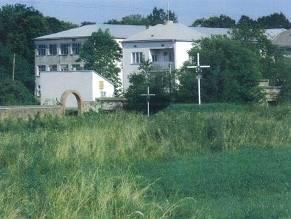|
Analytics

Photo by Mark Freiman
|
Did Canada honour Nazi allies or support a Jewish cemetery?
23.09.2019, Communities of Eurasia The Second World War is long in the past, but controversy over how to memorialize the Jewish and Ukrainian victims of the Nazis in the town of Sambir surfaced once again, following a memorial service on Aug. 21 that was attended by Canada’s ambassador.
The ceremony, and Canada’s participation in it, was criticized by the Simon Wiesenthal Centre and the Ukrainian Jewish Committee, which charged that it was intended to honour members of the Organization of Ukrainian Nationalists (OUN) and the Ukrainian Insurgent Army (UPA), both of which collaborated with the Nazis.
But event organizers say that it was actually intended to commemorate a recently struck deal meant to settle a longstanding dispute over crosses erected in Sambir’s Jewish cemetery to memorialize 17 members of the OUN who were killed by the Nazis.
A front-page story in the Sept. 17 edition of the National Post – headlined, Canada Honours Nazi Allies – quoted numerous critics of the memorial, one of whom, Eduard Dolinsky, the director general of the Ukrainian Jewish Committee, said that, “All Jews of Sambir were murdered by Nazis and their collaborators from OUN and UPA.”
An earlier JTA story quoted Efraim Zuroff, a longtime Nazi hunter from the Simon Wiesenthal Center, who said that, “This is clearly a whitewash of the horrible crimes committed against Jews in Sambir and only reinforces the highly problematic tendency in Ukraine to hide Holocaust crimes committed by Ukrainians.”
The JTA report also quoted a number of people who criticized the chief rabbi of Ukraine, Yaakov Bleich, for participating in the ceremony.
However, Jewish and Ukrainian organizations in Canada, the Jewish community in Ukraine, along with the ambassador of Ukraine in Ottawa rejected the contention that the commemoration of the wartime murders in Sambir amounted to honouring Nazi allies.
In an emailed response to questions from The CJN, a spokesperson for the Ukrainian Jewish Encounter, a Canadian organization that helped broker the deal and organize the event, said that, “OUN is not being memorialized, let alone glorified.…
“There is a tombstone erected over the burial place of 17 young nationalists who were shot by the Nazis in a corner of the cemetery in 1944. This was a key compromise.… In accordance with Jewish religious requirements, this area will be demarcated in a manner that will result in it not being considered part of the Jewish cemetery.”
The Ukrainian Canadian Congress issued a statement, saying that, “Canada has been central in helping to resolve the issue of appropriate Holocaust commemoration in Ukraine.…
“This is not a monument to Ukrainian nationalists, it’s a grave marker. It’s part of a compromise in a much larger discussion that will lead to a Memorial Park dedicated to remembering the victims of the Holocaust.”
In a statement, the Coordination Council of the Vaad of Ukraine expressed “full confidence in and support of the Ukrainian Jewish Encounter, the Kiev city Jewish community and Rabbi Bleich in their efforts to memorialize Nazi victims and organize the mourning ceremony in Sambir.”
The Centre for Israel and Jewish Affairs (CIJA) also said that it has no problem with the Canadian ambassador’s participation in the memorial.
“Given that Canada has a long history of contributing to achieving a positive outcome on this issue for all the competing interests involved, it was entirely appropriate for Canada to send a delegation to the event,” said Martin Sampson, CIJA’s vice-president of communications and marketing.
The controversy dates back to 1943, when Nazi units gathered at least 1,200 Jews from the town at the local Jewish cemetery and shot them.
In July 1944, at the edge of the same cemetery, the Nazis executed 17 member of the OUN, a group that had collaborated with the Nazis, then turned against Third Reich and then resumed their collaboration.
Over the years, the cemetery fell into disrepair. In 2000, Jack Gardner, a philanthropist from Victoria who was born in Sambir, received permission to repair the site. A Jewish symbol was put up, but it was destroyed by local residents and three 10-metre crosses were erected in the middle of the cemetery.
Over the years, Mark Freiman, a Jewish lawyer from Toronto and former president of the Canadian Jewish Congress, whose parents hailed from Sambir, worked to move the crosses to another location. Eventually, an agreement to remove the crosses was reached, but only one of them was removed.
On Aug. 21, a “ceremony of sanctification of the future ‘Remember’ Memorial Complex to victims of World War II in Ukraine,” was held at the cemetery in Sambir, according to the Coordination Council of the Vaad of Ukraine.
Reporting on the ceremony, JTA quoted Rabbi Bleich saying it was part of a compromise meant to finally give the town’s Jews peace. Jewish activists and local residents had agreed that the crosses would be removed and a monument to the OUN victims established at the edge of the cemetery.
“The question is, what is our goal here,” Rabbi Bleich said at the time. “Not to memorialize the Ukrainians but to get the crosses down and get a fitting memorial to the Jews who were killed.”
Ukraine’s ambassador to Canada, Andriy Shevchenko, told The CJN that “the idea was to commemorate the victims of the Holocaust and the other victims of World War II. For us, we are looking for the best way to do so, with respect to the different cultural and religious traditions of the victims.”
He said there is broad support in Ukraine for that kind of memorial. “It’s a very good example of reconciliation,” he said. “We are grateful to those Canadians who are helping heal the wounds of World War II.”
As to the recent media reports in Canada criticizing the Canadian ambassador, Shevchenko called it “an example of Kremlin-style, or Putin-style, propaganda of half-truths, half-myths on an industrial scale.”
By Paul Lungen
CJN
|
|
